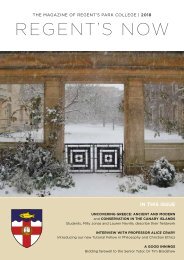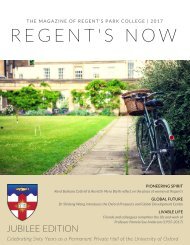Regent's Now Magazine 2019 WEB
Create successful ePaper yourself
Turn your PDF publications into a flip-book with our unique Google optimized e-Paper software.
REGENT’S NOW FEATURES
Despite a later adult decision against Christianity, throughout her
life Murdoch felt a continuing attraction to the figure of Christ,
whom she easily divorced from the institution of the Church. She
appears to have recognised what she calls the ‘worth’ of religion
– Christianity, in particular – while in adult life coming to think
that its narrative is nothing but a ‘fairy tale’. And her fascination
with organised religion is there to see throughout her novels, as
many readers know, littered as they are with examples of ‘failed’
Christians, priests not least amongst them.
Murdoch’s interest in theology, however, was lifelong and founded
in an early conviction that the divorce between philosophy
and theology that was characteristic of British and French
philosophy during the middle part of the twentieth century was
fundamentally mistaken; the abandonment of metaphysical ideas
in both disciplines that was one of the chief characteristics of the
linguistic models that prevailed.
“Murdoch’s novels provide
an ‘unending commentary’
on forgiveness and the
impact it has on our
friendships and well-being.”
In organising our symposium, we were fortunate in having
the support of some of the leading Murdoch scholars of this
generation. Miles Leeson is Senior Lecturer in English Literature
at Chichester University and the Director of the Iris Murdoch
Research Centre. He is the lead editor of the Iris Murdoch
Review and has published widely on Murdoch’s work, including Iris
Murdoch: Philosophical Novelist (Continuum, 2010). In an opening
paper entitled ‘Murdoch and Fictionalised Theology’, the scene
was set for the remainder of our day, as the exact nature of her
interest in the theological task was illustrated through some of
the plots and characters of her novels. In the paper that followed,
Anne Rowe, Visiting Professor at the University of Chichester
and Emeritus Research Fellow with the Iris Murdoch Archive
Project at Kingston University, investigated Murdoch’s interest
in Christian spirituality in a paper entitled ‘Anchorites as God’s
Spies: Iris Murdoch and Dame Julian of Norwich’, in a deliberate
treatment of the influence of one particular writer on another.
Our own Paul Fiddes – Principal Emeritus – then treated us to an
examination of Murdoch’s very real desire not to confuse ‘God’
and ‘Good’, by looking at her treatment of both in two very specific
novels, The Time of the Angels and The Good Apprentice. Murdoch
once claimed, as a convinced Platonist, that ‘We can lose God
but not (the) Good’. If the idea of ‘God’ serves any purpose at all,
then it can only be as yet another pathway on the way to realising
the Good. And the formal part of the day came to an end with
a paper from Scott Moore, Associate Professor in the Faculty
of Philosophy at Baylor University and longstanding friend of
the College, who spoke on the theme of ‘Forgiveness and the
Beautiful: The Unexpected Strangeness of the World in Iris
Murdoch’. The paper took as its cue the fact that Murdoch’s
novels provide an ‘unending commentary’ on forgiveness and
the impact it has on our friendships and well-being; that in their
own way all of the novels are about friendship and its failures,
with a concomitant need to recover ‘love’ as a central concept in
building a moral philosophy.
Perhaps the most ‘difficult’ part of the day belonged to our
‘Symposium respondent’, Priscilla Martin, emeritus Fellow
of St Edmund Hall and member of the English Faculty. In
a mere twenty minutes, she was presented with the task of
summarising some of the main themes and cross currents of
the day as she had interpreted them. It is never an easy task,
but Priscilla’s pointers gave us much for the subsequent plenary
discussion to round off what had been a deeply enjoyable time.
Blessed with fine weather, the beauty of the College quad at
that time of the year, and the excellence of our catering team,
all participants departed with much to rejoice in and to ponder
further.
Iris Murdoch was a novelist who took the moral life more
seriously than one will find in the work of most other
contemporary authors. Her consistent desire to prove that
the good life is possible, that many people seek to live it even
when they wouldn’t know, or actively acknowledge, that
they are doing so, continues to make her work a source of
fascination and ongoing engagement to theologians. If our
little contribution to that particular endeavour has served that
purpose, then we are glad to have done so.
We hope to publish the papers from the Symposium in
due course.
The Revd Andrew Taylor is a priest in the Church of England,
currently serving in the Diocese in Europe. He is a research
associate of the Oxford Centre for Religion and Culture at
Regent’s Park College.
“Some Murdoch scholars believe
that, had it not been for her
marriage… she may have made
a more significant contribution
to the task of theological
conversation than she did.”
15





